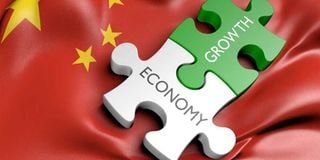China’s economic puzzle: Navigating new challenges

What you need to know:
China’s prowess in producing solar panels, wind energy, and electric vehicles has attracted scrutiny from Western competition policy analysts and led to import restrictions. This could result in manufacturing bottlenecks for China.
China is grappling with significant economic challenges, primarily due to a weakening real estate sector and a strategic pivot towards high-tech industries. President Xi Jinping's focus on national security and his skepticism towards market forces are intensifying these issues, creating a conflict between political objectives and economic necessities.
The real estate sector, once a cornerstone of China's economy, contributed a substantial 30% to the national GDP at its peak in 2018. However, this sector has experienced a marked decline, further exacerbated by the COVID-19 pandemic.
Currently, it operates at about half its former capacity, reflecting a significant downturn. This decline has had a profound impact on the broader economy, with property sales plummeting by 20.5% in the first two months of 2024.
The downturn in the real estate sector has not only affected economic growth but also led to a decrease in consumer confidence and spending, further complicating China's economic landscape.
In response to these challenges, the Chinese government has been attempting to shift its economic focus towards high-tech industries, aiming to foster innovation and reduce reliance on traditional sectors. However, this transition has been fraught with difficulties, as it requires substantial investment and a skilled workforce. Additionally, Xi Jinping's emphasis on national security and his cautious approach towards market mechanisms have created an environment of uncertainty, deterring both domestic and foreign investments.
The interplay between political priorities and economic realities continues to shape China's economic trajectory, posing significant challenges for policymakers as they navigate this complex landscape.
Historically, the real estate sector in China was more than just a financial powerhouse; it was a key driver for various ancillary sectors. It created jobs in construction, spurred retail development, and boosted banking through loans, fostering a dynamic cycle of economic growth.
6. However, as China transitions towards a middle-class society, Xi Jinping’s administration is moving away from this growth model. The government’s ‘Three Red Lines’ policy, aimed at mitigating substantial risks among heavily indebted property developers, has led to reduced residential investment. This policy reflects Xi’s strategic shift towards more technologically advanced industries, such as artificial intelligence, big data, bioengineering, semiconductors, and quantum computing.
This shift aligns with a broader strategy to reposition China’s economy towards high-tech industries, reflecting global trends that prioritize scientific innovation and smart technology. Crucially, it aims to gain an edge in the US-China rivalry.
Xi Jinping’s focus on national security over economic flexibility complicates this transition. His deep-rooted skepticism of market forces, influenced by the corruption and ideological deviations experienced during former President Hu Jintao’s administration, continues to shape economic policy. This cautious approach has led to increased scrutiny and restrictions on major tech firms, reflecting a strategy of economic statecraft that favours strong state control over market-driven growth.
The government’s focus on strengthening state-owned enterprises, often at the cost of the private sector, represents a clear political choice. While the private sector has historically been a hub of innovation and economic dynamism, state-owned enterprises, burdened by bureaucracy, struggle to achieve similar success in cutting-edge technology. Xi Jinping’s strategy stifles entrepreneurial spirit and limits the private sector’s ability to innovate and compete on a global scale. This approach has already influenced career aspirations among the youth, who increasingly seek stable government jobs over the uncertainties of entrepreneurship.
Despite achieving a 5.3% GDP growth in the first quarter of 2024, the International Monetary Fund (IMF) warns that China’s economic recovery could take several years, potentially leading to a medium-term slowdown. The manufacturing sector, once a pillar of strength, is showing signs of revival but cannot fully compensate for the significant downturn in real estate.
China’s prowess in producing solar panels, wind energy, and electric vehicles has attracted scrutiny from Western competition policy analysts and led to import restrictions. This could result in manufacturing bottlenecks for China.
Consumer confidence remains low, with retail sales growth slowing to 2.3% year-on-year in April 2024, down from 3.1% in March. This decline in consumer spending highlights the ongoing economic uncertainties and the lingering negative wealth effects from the real estate market downturn.
The government is in a tough spot. It needs to spark growth without falling back on old strategies that no longer address the country’s current issues. However, Xi Jinping’s strong grip on political control is stifling entrepreneurship. The real challenge is not just in backing Xi’s new economic strategy, focused on ‘new productive forces’ outside the real estate sector, but also in executing it quickly enough to see tangible results. This is essential to achieve a V-shaped recovery and avoid slipping into a recession.
This situation poses a major challenge to Xi Jinping’s ideological stance, which favours a Marxist-socialist model over Western capitalist systems. Xi’s drive for ‘common prosperity’ aims to address income inequalities that have been exacerbated by years of uneven economic growth. Unlike former leader Deng Xiaoping, who allowed such disparities to facilitate economic reforms and opening-up, Xi is now emphasizing income equality and regional equity. This marks a significant shift back to state-led initiatives.
Some analysts believe China’s economic situation isn’t as bleak as portrayed. Despite measures announced in May 2024 to stabilize the property sector, doubts persist about their feasibility. Xi Jinping faces the challenge of balancing political strength and economic wisdom, a rare combination, to implement these policies effectively.
Under Xi, the blend of governance, ideology, and market dynamics means political decisions heavily impact economic outcomes. The challenge is to balance economic growth with ideological goals. Known for its resilience, China faces a shrinking window to recover from significant setbacks.


